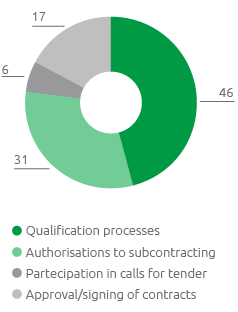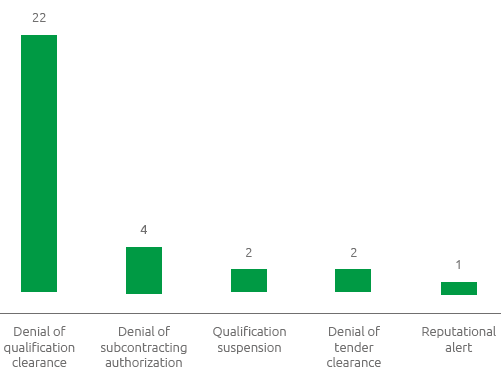The fight against corruption and illegality
The main internal regulatory framework for fighting corruption is the Anticorruption Guideline which applies to Snam and the subsidiaries and which the other participating companies have been made aware of in order to promote principles and behaviour consistent with those expressed by Snam. The Guideline is inspired by the principles of ethics, transparency, fairness and professionalism already referred to in the Code of Ethics and also strives for the continuous improvement of the sensitivities of the Snam people in recognising corruption issues and other types of fraud, as well as their responsiveness in taking an active role in preventing, suppressing or reporting possible violations of the anticorruption laws. The Anticorruption Guideline is consistent with the tenth principle of the Global Compact that states that businesses should work against corruption “in all its forms, including extortion and bribery” and clearly outlines permitted and prohibited conduct. In particular:
- it prohibits the offering, promising, giving, paying, or allowing anyone to give or pay, directly or indirectly, an economic or material advantage or other benefits to a public official or to a private person (Active Corruption); it prohibits accepting the request from, or solicitations from, or allowing someone to accept or solicit, directly or indirectly, an economic or material advantage or other benefits from anyone (Passive Corruption);
- it pays particular attention to the selection of suppliers and the qualification process, the awarding of contracts, the management of contracts, the standard terms of protection, including those of commitment to respect Anti-Corruption Laws and to verify the ethical requirements of suppliers;
- it establishes that all relations with Snam which refer to or involve third parties should be conducted in compliance with the provisions of the Anticorruption Guideline and the instruments therein.
The Anti-Corruption Guideline is part and parcel of a broader business ethics control system adopted by Snam that aims to ensure the company’s compliance with national and international laws and best standards. In this regard, Snam provides special awareness training to its staff and carries out monitoring activities to analyse the degree of dissemination and knowledge.
To prevent the risk of corruption and fraud in general in supply chain relations, all suppliers and subcontractors are required to sign the Ethics and Integrity Agreement that allows the performance of reputational analysis aimed at the early identification – also based on public information – of possible risks of infiltration by organised crime.
In 2018, Snam collaborated with:
- the OECD taking part in the:
- Anti-Corruption and Integrity Forum in Paris in March. Snam was the only Italian private company to take part in a discussion comparing the various national approaches to the fight against corruption and the promotion of integrity in businesses;
- at two discussions, in specific seminars, held at St. Petersburg and Moscow in June, which Snam was the only European company to take part in, on respectively: i) the improved control procedures in companies aimed at identifying any unlawful behaviour; ii) the contribution of companies in the public participation in the development of the new OECD guidelines on business integrity;
- at the Working Party on State Ownership and Privatisation Practices, organised in November, also in Paris, Snam intervened on the issue of promoting integrity and preventing corruption at corporate level, illustrating the company’s experience in the management of relations with its business associates, also for the purpose of defining the new Guidelines on the subject;
- Transparency International, intervening:
- at the “BIF Roadshow 2018 – Against grey areas and corruption for a culture of legality” held in Terni in the month of June. Specifically, Snam participated illustrating the actions that the company has undertaken to disseminate the principles of business integrity in relations with suppliers;
- at the presentation of the Business Index on Transparency at the Business Integrity Forum held in November. On this occasion, the Company took part in a discussion comparing good practices for fighting corruption and, as the representative of the Energy sector, it stood out for its own best practices and for the extent of its culture of business ethics and preventive measures adopted;
- the Ministry of Foreign Affairs and International Cooperation, taking part in:
- the “27th Session of the United Nations Commission on Crime Prevention and Criminal Justice” organised in May under the auspices of the Italian Business Integrity Day, in conjunction with Transparency International, at the United Nations in Vienna. The event was also preceded by a seminar at the International Anti-Corruption Academy, where Snam illustrated its experience in the fight against corruption;
- at the Italian Business Integrity Day (IBID), in December at the Italian Embassy in Washington. Snam took part in a discussion about preventive approaches implemented by businesses, counterparty risk management and new strategies to make the internal anticorruption control system effective;
- at the 2018 International Anticorruption Day at the Ministry of Foreign Affairs and International Cooperation in December. The Company was invited by the Ministry to take part in the revision of the first draft of the G20 High-Level Principles, on the issue of the prevention of corruption and the promotion of integrity in public or investee companies, which is expected to be finalised in 2019.
On these occasions the Company illustrated its instruments for overseeing transparency and fighting against corruption. Additionally, in matters of business ethics, legality and anti-corruption, approximately 321 hours of training were provided to new employees.
Snam, computerised the data flows to the National Anti-Corruption Authority. The direct interface between the computer systems, allows the Tender ID Code (IGC) to be obtained, to eliminate all manual filling procedures and to improve traceability, transparency and security for all the operations.
Reputational checks
In 2018, about 2,074 reputational checks were carried out on suppliers, subcontractors and participants in calls for tender.
31 measures were adopted as a result of these checks.
Breakdown of reputational audits (%)

Measures (no.)
